'They're not trained marksmen': The risk of gun crime in Edmonton and how police are cracking down
A second police team dedicated to investigating shootings in Edmonton is starting at the end of the month.
The Edmonton Police Service Firearms Investigation Unit (FIU) currently has eight officers.
With funding help from provincial police agency Alberta Law Enforcement Response Teams (ALERT) that will expand to 16 officers March 31.
“As we get convictions through court and as these offenses have significant jail time, I think word will get out that Edmonton is taking gun crime seriously,” said EPS FIU Detective Thomas Hapke.
Hapke has been a detective with the unit since it was created in 2019.
He says when it first started, investigators were mainly focused on cracking down on straw trafficking — the act of buying guns legally and then selling them illegally — but the landscape has changed.
“With the handgun freeze or the handgun ban, we're seeing that a lot less because you can't purchase a handgun lawfully. So that’s seen an increase in 3D-printed firearms and an increase in imported guns.”
EPS announced its first “significant seizure” of 3D-printed guns last month.
Quebec police alerted local authorities that an Edmonton man was buying metal parts known as rail kits specifically for 3D-printed guns.
That led officers to 29-year-old Roy Tucker’s home.
There they found a large commercial grade 3D printer, firearm blueprints and devices containing illegal computer code to print 3D-printed firearms.
Twenty handguns, 27 high-capacity magazines and two prohibited semi-automatic firearms — believed to have been smuggled in from the U.S. — were also seized.
“It was a bit extraordinary I thought. It was very well organized and the risk to that, just the bulk of it, in my opinion was very high. Luckily we got to those before they went out on the streets,” said Hapke.
Guns found on our streets
Hapke showed CTV News Edmonton about a dozen guns previously seized by city police that they commonly see.
Among them, sawed off shotguns, handguns, a 3D-printed gun and a gun manufactured in a machine shop.
“It’s a fully automatic MAC-10 style firearm. And this is a silencer or suppressor and it gets screwed onto the end and suppresses the noise of the automatic firearm.”
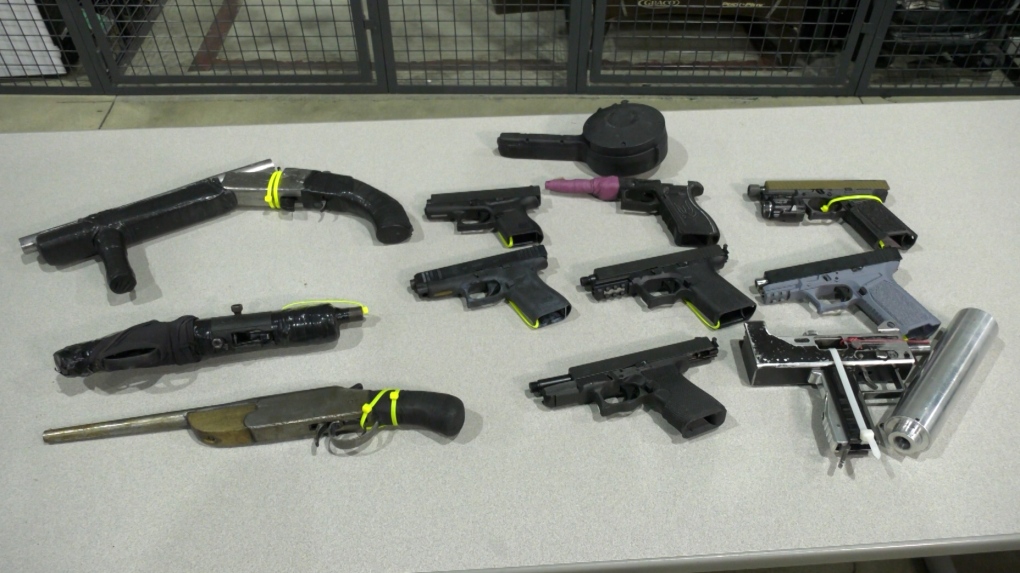 EPS display "common" guns found on Edmonton streets on March 7, 2024. (CTV News Edmonton)
EPS display "common" guns found on Edmonton streets on March 7, 2024. (CTV News Edmonton)
Hapke also displayed a device — known as a selector switch or glock switch — that can be installed on the back of a firearm to make it fully automatic.
“When you are looking at a larger group, the potential for innocent victims is significantly higher and it makes the accuracy a lot less.
“They’re illegal in Canada. They’re prohibited devices.”
Because they are easy to hide, Hapke says handguns are often a weapon of choice for criminals.
“Our most common firearm we’re seeing used in shootings is a nine-millimeter which I think is more about the accessibility of it. There’s more of them. The ammunition is easier to obtain.”
He says there are a number of reasons one may choose to carry.
“A lot of them have an organized crime component to them but not all of them.
“Due to being involved in the criminal world you feel the need for protection as well. It’s not necessarily, ‘I am going to go shoot somebody,’ but it’s ‘I am going to make sure I don’t get shot.’ But that’s problematic.”
Rising gun crime
Statistics Canada reports in 2022, violent gun crime hit its highest level since the agency began collecting this data in 2009.
A total of 13,937 incidents were reported country-wide, a 10.9 per cent increase from the year prior.
Alberta came in second only to Ontario at 2,481 incidents and 4,791 incidents respectively.
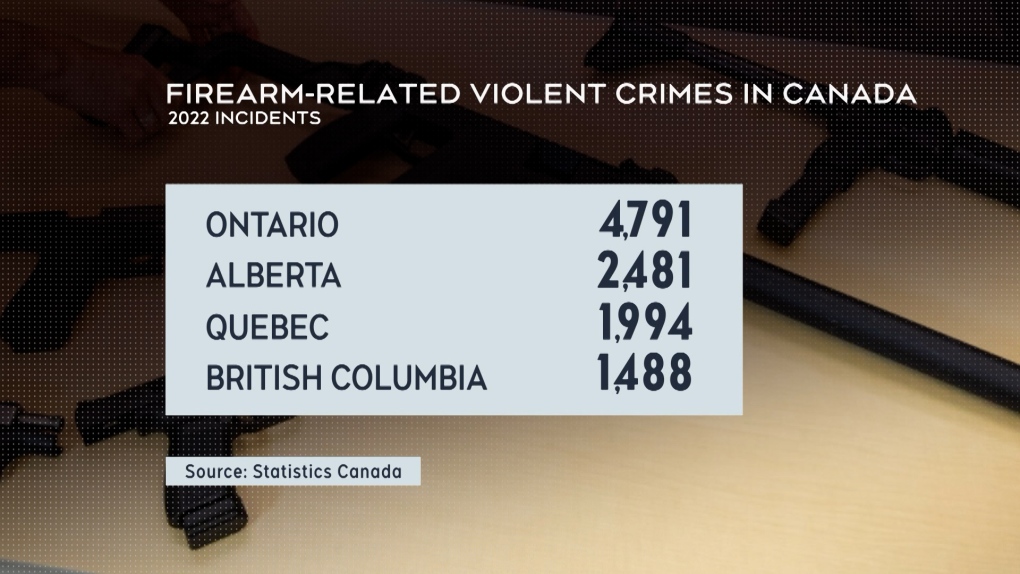 In Edmonton last year, a record 221 shootings were reported.
In Edmonton last year, a record 221 shootings were reported.
“I just feel like everybody nowadays feels like they have to have one. For what reason? I don’t know,” said Staff Sgt. Eric Stewart, the head of EPS’ guns and gangs section.
Stewart said the new generation of criminals — whether they’re gang members, organized crime members or involved in other criminality — seem to have a greater disregard for human life.
“I would say in the last two years, 2022 and 2023, we have seen an increase in the brazenness of shootings, carelessness, you know. Individuals are going in and shooting in more public settings, daytime hours.
“Obviously that causes us concern because every time a round is fired, the chances of them missing their target — a car, a house, an individual — is very high. They’re not trained marksmen.”
Using science to crack down on gun crime
Stewart says cutting down on gun crime is a top priority for EPS.
Three years ago, the service opened its own forensic laboratory to process evidence from shooting investigations.
It previously relied on the RCMP firearms lab.
“They were also servicing everybody across Canada so you could understand, the workload was through the roof,” said Stewart.
“No fault to them. They weren’t able to turn around that evidence that we need in a timely fashion.”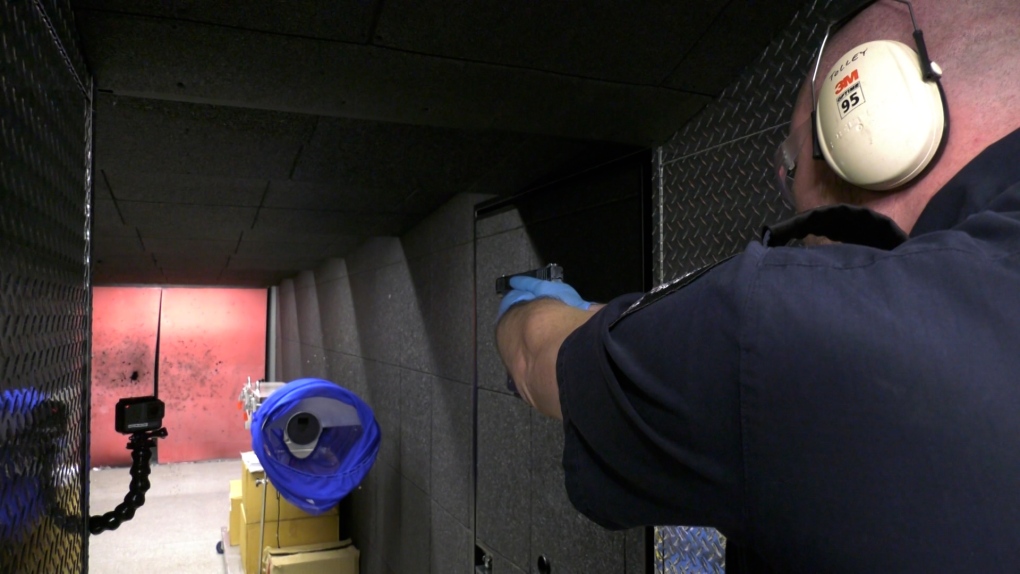 EPS firearms analyst Cst. Eric Tolley testing seized guns at an indoor range on March 5, 2024. (CTV News Edmonton)
EPS firearms analyst Cst. Eric Tolley testing seized guns at an indoor range on March 5, 2024. (CTV News Edmonton)
As a trained gunsmith and former EPS firearms instructor, Cst. Eric Tolley got the first position at the Edmonton lab known as the Firearms Examination Unit (FEU).
Part of his job is firing illegal guns seized by police.
“We try to get at least three cartridges out of it. If it's been seized with ammunition as well, we’ll test-fire that ammunition so we can say in court that it was functional ammunition, functional firearm,” explained Tolley after a demonstration at the facility’s indoor firing range.
Even when police don’t have a weapon to analyze, much can be learned.
Tolley compares information gleaned from cartridge casings to fingerprints.
“Every time a cartridge is fired in a firearm, the firearm leaves an impression on the cartridge and we can actually look at those microscopically and we can match the same casings to the same firearm.”
The lab includes a $132,000 device known as Integrated Ballistics Identification System (IBIS) that takes high-definition 3D images of cartridge casings.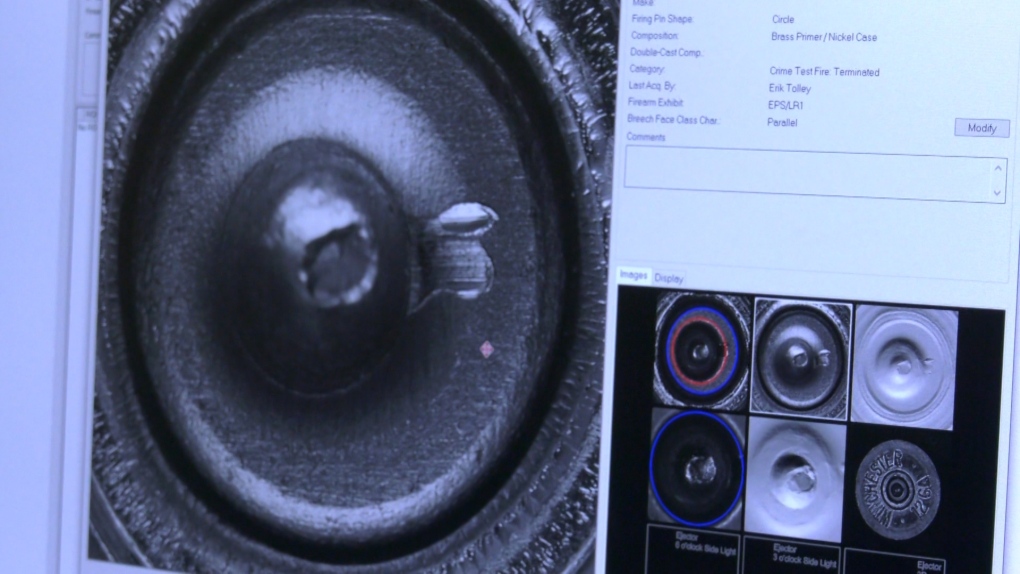 Image of cartridge casing taken by EPS' Integrated Ballistic Identification System (IBIS) on March 5, 2024. (CTV News Edmonton)
Image of cartridge casing taken by EPS' Integrated Ballistic Identification System (IBIS) on March 5, 2024. (CTV News Edmonton)
This information is added to a federal database run by RCMP in Ottawa.
“Quite often, crime guns will have made their way all over the place and we’ll end up getting matches to one or two cities. Some of them we’ve matched to crime scenes in the United States and they’ve been smuggled up here.”
Tolley says most of the handguns that come across his desk aren’t from Canada.
He says the lax gun laws in the U.S. are of benefit to criminals here.
“It is a problem.
“There’s a lot of people who, their whole business is smuggling firearms across the border. It’s every bit as lucrative as smuggling drugs and other things.”
Gun storage running low
The EPS gun vault, where police store seized firearms, is currently at capacity.
The vault contains about 6,500 guns according to Stewart.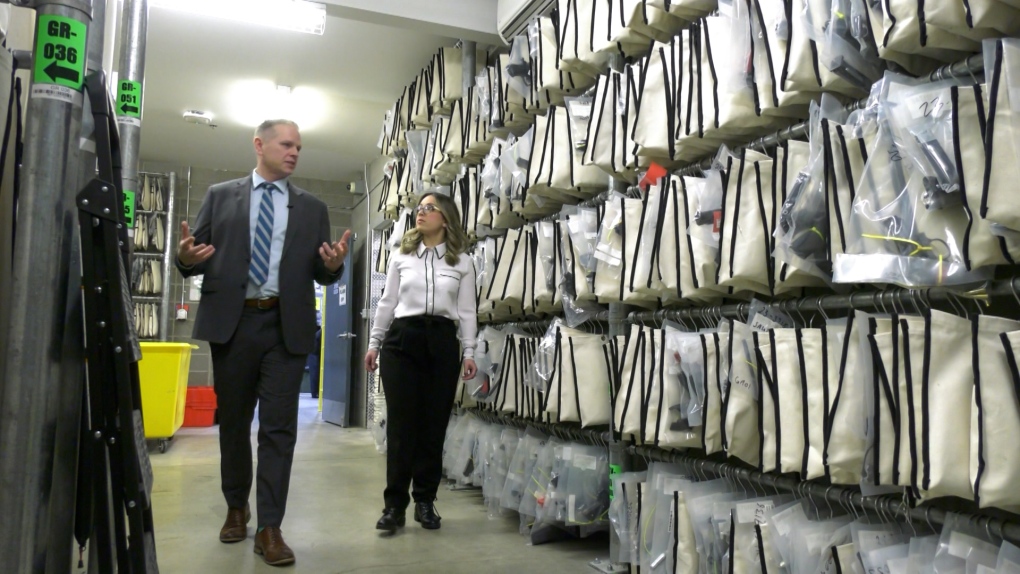 Staff Sgt. Eric Stewart shows CTV News Edmonton's Nicole Weisberg the EPS gun vault on March 7, 2024. (CTV News Edmonton)
Staff Sgt. Eric Stewart shows CTV News Edmonton's Nicole Weisberg the EPS gun vault on March 7, 2024. (CTV News Edmonton)
“So this is just another room we’ve utilized, so we have to find space,” he said while showing off a storage area in a different part of the building.
Firearms that have gone through the court process are regularly destroyed — cut into pieces and sent to a recycler — but it is not keeping up with the number coming in.
“The last five months we have seen a slow decrease in shooting events in our city. Yes, we’re going to have some upticks in our city. We’re going to see those events go high again, during certain months,” said Stewart.
“But our job now, with the resources we have…is to do a better job to hold these individuals accountable.”
CTVNews.ca Top Stories

Bird flu, measles top 2025 concerns for Canada's chief public health officer
As we enter 2025, Dr. Theresa Tam has her eye on H5N1 bird flu, an emerging virus that had its first human case in Canada this year.
DEVELOPING Body found in wheel well of plane at Maui airport
A person was found dead in the wheel well of a United Airlines flight to Maui on Tuesday.
Ottawa police identify victim of Christmas Day homicide in Hintonburg, charge suspect
The Ottawa Police Service says the victim who has been killed on Christmas Day in Hintonburg has been identified.
Christmas shooting at Phoenix airport leaves 3 people wounded
Police are investigating a Christmas shooting at Sky Harbor Airport in Phoenix that left three people injured by gunfire.
Your kid is spending too much time on their phone. Here's what to do about it
Wondering what your teen is up to when you're not around? They are likely on YouTube, TikTok, Instagram or Snapchat, according to a new report.
Bird flu kills more than half the big cats at a Washington sanctuary
Bird flu has been on the rise in Washington state and one sanctuary was hit hard: 20 big cats – more than half of the facility’s population – died over the course of weeks.
Swimmer Summer McIntosh voted The Canadian Press female athlete of the year for 2024
During the month before her 18th birthday, Summer McIntosh became the first Canadian to win three gold medals in a single Olympic Games, winter or summer, with a silver medal thrown in for good measure.
6,000 inmates stage Christmas Day escape from high-security Mozambique prison
At least 6,000 inmates escaped from a high-security prison in Mozambique's capital on Christmas Day after a rebellion, the country's police chief said, as widespread post-election riots and violence continue to engulf the country.
Plush toys recalled due to choking hazard
Health Canada announced a recall on a series of plush toys due to a choking hazard. Anyone who has purchased an elephant, giraffe, lion, tiger and/or panda plush toy with an attached baby can return them to the place of purchase for a refund.




























